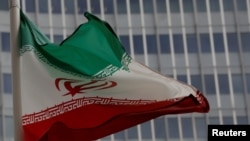Britain, France, and Germany say Iran's apparent plan to install additional advanced centrifuges at its main nuclear enrichment facility is “deeply worrying" and contrary to the 2015 nuclear deal with world powers.
"If Iran is serious about preserving a space for diplomacy, it must not implement these steps," the three powers, dubbed the E3, said in a joint statement on December 7.
A confidential report by the U.N.’s atomic watchdog, the International Atomic Energy Agency (IAEA), said Iran plans to install three more cascades of advanced IR-2m centrifuges in its underground plant at Natanz.
Under the 2015 nuclear deal, Tehran can only use first-generation IR-1 centrifuges, which refine uranium much more slowly, at Natanz.
The breach is the latest in a series of violations by Iran of the nuclear deal in response to President Donald Trump's decision to withdraw the United States from the accord and his reimposition of punishing economic sanctions.
The agreement is the best and currently the only way to monitor and constrain Iran's nuclear program, the three countries said.
In their statement, the three European powers also rebuked Iran over an Iranian law requiring the government to halt UN inspections of its nuclear sites and step up enrichment beyond the nuclear deal's limits if the remaining signatories to the 2015 deal — Britain, France, Germany, China, and Russia — do not provide relief from sanctions.
The trio said the legislation is incompatible with Tehran’s commitments to the nuclear accord, known officially as the Joint Comprehensive Plan of Action (JCPOA), which scrapped sanctions against Iran in return for curbs to the country’s nuclear program.
"Such a move would jeopardize our shared efforts to preserve the JCPOA and also risks compromising the important opportunity for a return to diplomacy with the incoming U.S. administration," the statement reads.
U.S. President-elect Joe Biden, who takes office on January 20, has said he is willing to rejoin the nuclear agreement if Iran moves back into compliance.
Tehran says its breaches can quickly be reversed if sanctions on Tehran are dropped.




